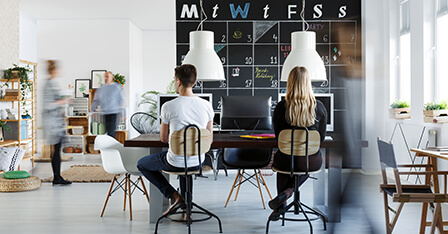by Emma-Jane Packe, Managing Director of The Supper Club
Stats might suggest that offices are becoming redundant, but members of The Supper Club are successfully using workspace to attract and retain talent.
Self-employed workers now account for 15% of the UK workforce, according to ONS, and 64% of millennials work from home or another location according to Deloitte’s 2017 Millennial Survey.
Technology has enabled this of course, with cloud solutions, collaboration tools, and increasingly intelligent phones making it easier for people to work anywhere.
“Employers have increasingly embraced flexible and remote working to reduce the costs associated with office space and gain access to a wider pool of talent, both around the country and around the world. This has made it easier for people to become freelance or contract workers,” observes Simon Burckhardt, MD of cloud-based communications provider Vonage UK.
This has helped to boost the number of sole traders and home-based businesses, now 4.7 million and 2.7 million respectively according to research from ONS commissioned by Vonage UK.
“As a former small business-owner myself, I appreciate how lonely self-employment can be. Technology enables communication and collaboration, but meaningful human connection is vital. Providers of shared workspaces are doing more to facilitate networking and creative collisions between founders.”
The Office Group, co-founded by Supper Club member Olly Olsen and Charlie Green, has grown by providing co-working space that fosters a community feel. “It’s very difficult to find a metric that proves the link between the right kind of environment and productivity,” says Charlie Green. “But it’s so obvious that if you create an environment that people want to be in as opposed to want to get away from then happier people are going to be more productive people.”
Fellow member Divyang Mistry, founder of Leesman, has built his business around the link between workspace and productivity. The Leesman Index captures employee feedback on how effectively the workplace supports them and their work so organisations can see how their your building is performing.
“The world of work has changed a lot in the last 20 years. What works well now is a variety of workspaces within an office, and empowerment of staff to be able to use them. It’s about enabling people to do their everyday jobs properly. Lots of offices are open plan, for example, but what if you need somewhere more private to meet or make a call?”
Divyang debunked some myths about what different generations want from their workspace in The Supper Club’s Talent Tactics guide. “We find that younger people, especially, want to work in an office. When they’re at an earlier stage in their career, they’re learning all the time. Older workers know what to do and they may need more flexibility because of childcare or parent care so they want to be out a bit more. The younger generation want to learn, they want to interact with others, be mentored, make relationships. All those things are very hard when you’re a remote worker.”
Some members have seen a high return on investment in workspace as part of a package of differentiator benefits.
“The office environment is an expression of how your company values the team,” says Syd Nadim, founder of Clock and Swipe Station. “It doesn’t just mean putting in a fully functioning kitchen or a barista-style coffee machine (which we have). At our beautiful 18th Century School House, team members can choose to work in quiet rooms, in the bustle of the main studio(s) or at home. As a result, our staff attrition is 4%.”
This point is echoed by Derek Moore, Founder of Coffee & TV, who has created a boutique-hotel space for his high performing team. “It attracts quality staff. We want it to indicate our values as exceptional (people and workspace). It has multiple effects that aren’t necessarily obvious at the start but as it beds in you really see it exponentially increase the quality and volume of work that’s done, because staff are enthusiastic about coming into work and enjoy it.”
Workspace helps founders like Derek to compete for business as well as talent. “I’ve been doing this for a long time, and I’ve seen it from the other side – people who aren’t investing in their workspace. Those who do best are consistently the ones who are investing in their spaces. If you look at the top five competitors in our industry, you could almost rank their success by the quality of their workspace.”
So, offices worth braving the commute for are the way forward, providing the right balance of home from home and workspaces for different ways of working. Beer fridges and bean bags won’t attract or retain talent if they’re in soulless, shabby spaces – so think about how it reflects your values.
For more information about The Supper Club Visit: https://www.thesupperclub.com








